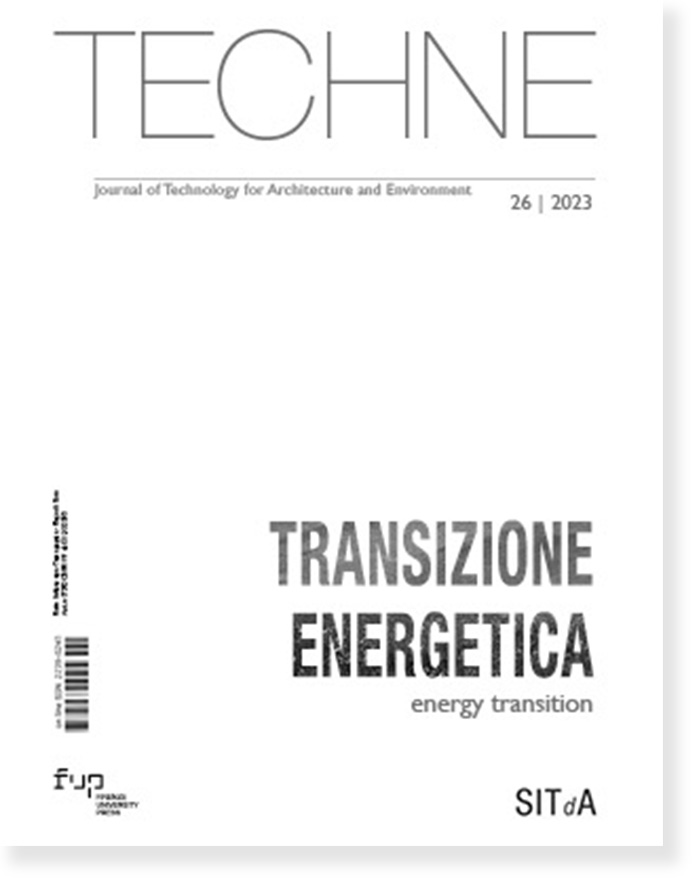Published 2023-10-31
Keywords
- Renewable Energy Communities,
- Energy transition,
- Sustainability,
- Urban regeneration,
- Public Housing (PH) districts
How to Cite
Copyright (c) 2023 Valeria D'Ambrosio, Alessandro Sgobbo

This work is licensed under a Creative Commons Attribution 4.0 International License.
Abstract
The paper presents the intermediate results of the design experimentation of a Public Housing development in which the Renewable Energy Community model is an opportunity for energy transition but also for the needs of social inclusion and collaboration, which characterise the complex conditions of contemporary housing. Demonstrating the transcalar and multifunctional effectiveness of RECs incentivises their implementation, especially when a complex demanding framework is confronted with limitedly available resources. Hence, through a systemic approach, simulative methods and impact indicators, the extent of the contribution offered by the REC model was verified not only in terms of decarbonisation and climate neutrality but as an opportunity for eco-social regeneration.
Downloads
References
Baratta, A. (2022), Una nuova visione dell’abitare e degli spazi dell’abitare nel PNRR, TECHNE Journal of Technology for Architecture and Environment, 24, 20-25.
Bassolino, E., D’Ambrosio, V., Sgobbo, A. (2021), Data Exchange Processes for the Definition of Climate-Proof Design Strategies for the Adaptation to Heatwaves in the Urban Open Spaces of Dense Italian Cities, Sustainability, 13(10), 5694.
Bichi, R. (2005), La conduzione delle interviste nella ricerca sociale, Carocci, Roma.
Cardone, B., D’Ambrosio, V., Di Martino, F., Miraglia, V., Rigillo, M. (2023), Analysis of the Ecological Efficiency Increase of Urban Green Areas in Densely Populated Cities, Land, 12, 523.
Chiaroni, D., Chiesa, V., Frattini, F. (2019), A rapidi passi verso la smart energy, in E. Sassoon (Ed.), Dallo sviluppo senza limiti ai nuovi limiti allo sviluppo, 81, Harvard Business Review.
D’Ambrosio, V., Di Martino, F., Rigillo, M. (2022), Digital geocomputational technologies for the metaproject of urban green infrastructures, AGATHÓN | International Journal of Architecture, Art and Design, 11, 162–171.
Dietz, T. (1987, Theory and method in social impact assessment, Sociological Inquiry, 57(1), 54-69.
Hall, P., Tewdwr-Jones, M. (2010), Urban and regional planning, Routledge, London.
Koirala, B. P., Koliou, E., Friege, J., Hakvoort, R. A., Herder, P. M. (2016), Energetic communities for community energy: A review of key issues and trends shaping integrated community energy systems, Renewable and Sustainable Energy Reviews, 56, 722-744.
Loorbach, D., Wittmayer, J. M., Shiroyama, H., Fujino, J., Mizuguchi, S. (2016), Governance of urban sustainability transitions, Springer Berlin.
Mazzarella, A. (1999), Multifractal dynamic rainfall processes in Italy, Theoretical and applied climatology, 63, 73-78.
Moritz, C., Agudo, R. (2013), The future of species under climate change: resilience or decline?, Science, 341(6145), 504-508.
Nussbaum, M. C. (2001), Women and human development: The capabilities approach, Cambridge University Press, Cambridge.
Rana, I. A. (2020), Disaster and climate change resilience: A bibliometric analysis, International Journal of Disaster Risk Reduction, 101839.
Sarzynski, A. (2015), Public participation, civic capacity, and climate change adaptation in cities, Urban climate, 14, 52-67.
Sgobbo, A. (2017), Eco-social innovation for efficient urban metabolisms, TECHNE Journal of Technology for Architecture and Environment, 14, 337-344.
Sgobbo, A. (2020), Inspiring & Training Energy-Spatial Socioeconomic Sustainability. SMC – Sustainable Mediterranean Construction, 12, 138-143.
Sgobbo, A. (2020), Sustainable Planning: The Carrying Capacity Approach. In C. Bevilacqua, F. Calabrò, L. Della Spina (Eds.), New Metropolitan Perspectives. NMP 2020. Knowledge Dynamics and Innovation-driven Policies Towards Urban and Regional Transition Volume 2 (pp. 633-642), Springer, Cham.
Sgobbo, A. (2022), METROpolitan WAter Communities. Un modello di economia circolare per la gestione integrata delle risorse idriche, TRIA Territory of research on settlements and environment, 15(2), 19-37.
Sgobbo, A., Moccia, F.D. (2016), Synergetic Temporary Use for the Enhancement of Historic Centers: The Pilot Project for the Naples Waterfront, TECHNE Journal of Technology for Architecture and Environment, 12, 253-260.
Skovbro, A. (2002), Urban Densification–A Sustainable Urban Policy?, WIT Transactions on Ecology and the Environment, 54, 517-527.
Stern, D. I., & Kaufmann, R. K. (2014), Anthropogenic and natural causes of climate change. Climatic change, 122, 257-269.
Wheeler, S. M. (Ed.) (2022), The sustainable urban development reader, Routledge, London.
Von Storch, H., Stehr, N. (2006), Anthropogenic climate change: a reason for concern since the 18th century and earlier, Geografiska Annaler: Series A, Physical Geography, 88(2), 107-113.






